2007 CHEVROLET MALIBU stop start
[x] Cancel search: stop startPage 313 of 510
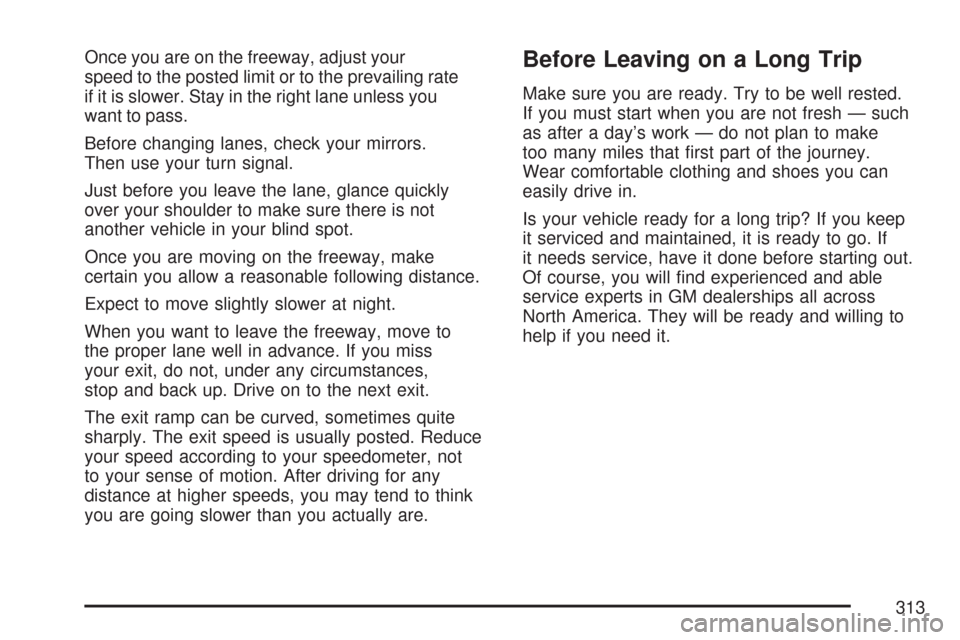
Once you are on the freeway, adjust your
speed to the posted limit or to the prevailing rate
if it is slower. Stay in the right lane unless you
want to pass.
Before changing lanes, check your mirrors.
Then use your turn signal.
Just before you leave the lane, glance quickly
over your shoulder to make sure there is not
another vehicle in your blind spot.
Once you are moving on the freeway, make
certain you allow a reasonable following distance.
Expect to move slightly slower at night.
When you want to leave the freeway, move to
the proper lane well in advance. If you miss
your exit, do not, under any circumstances,
stop and back up. Drive on to the next exit.
The exit ramp can be curved, sometimes quite
sharply. The exit speed is usually posted. Reduce
your speed according to your speedometer, not
to your sense of motion. After driving for any
distance at higher speeds, you may tend to think
you are going slower than you actually are.Before Leaving on a Long Trip
Make sure you are ready. Try to be well rested.
If you must start when you are not fresh — such
as after a day’s work — do not plan to make
too many miles that �rst part of the journey.
Wear comfortable clothing and shoes you can
easily drive in.
Is your vehicle ready for a long trip? If you keep
it serviced and maintained, it is ready to go. If
it needs service, have it done before starting out.
Of course, you will �nd experienced and able
service experts in GM dealerships all across
North America. They will be ready and willing to
help if you need it.
313
Page 338 of 510
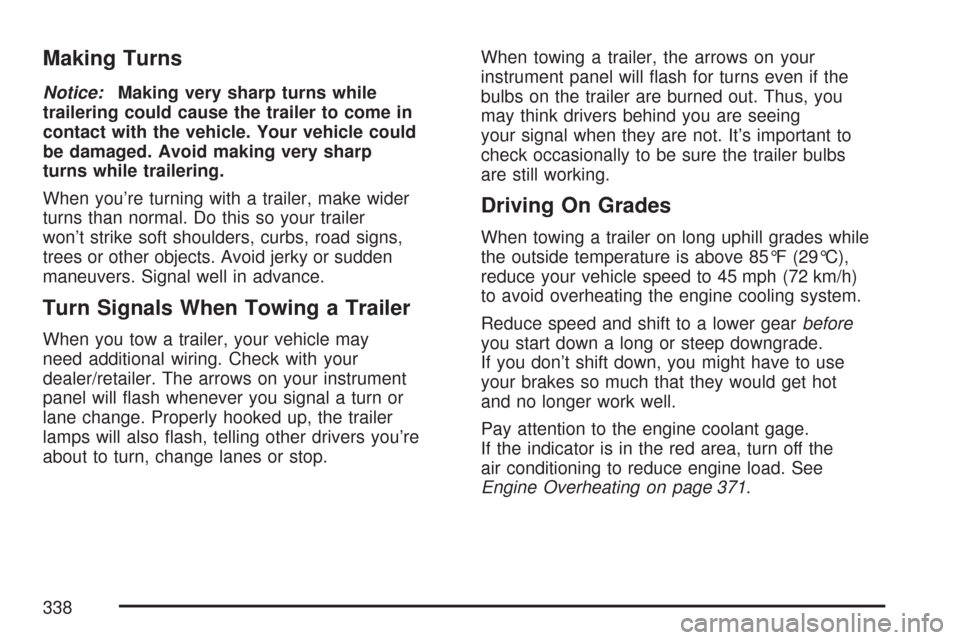
Making Turns
Notice:Making very sharp turns while
trailering could cause the trailer to come in
contact with the vehicle. Your vehicle could
be damaged. Avoid making very sharp
turns while trailering.
When you’re turning with a trailer, make wider
turns than normal. Do this so your trailer
won’t strike soft shoulders, curbs, road signs,
trees or other objects. Avoid jerky or sudden
maneuvers. Signal well in advance.
Turn Signals When Towing a Trailer
When you tow a trailer, your vehicle may
need additional wiring. Check with your
dealer/retailer. The arrows on your instrument
panel will �ash whenever you signal a turn or
lane change. Properly hooked up, the trailer
lamps will also �ash, telling other drivers you’re
about to turn, change lanes or stop.When towing a trailer, the arrows on your
instrument panel will �ash for turns even if the
bulbs on the trailer are burned out. Thus, you
may think drivers behind you are seeing
your signal when they are not. It’s important to
check occasionally to be sure the trailer bulbs
are still working.
Driving On Grades
When towing a trailer on long uphill grades while
the outside temperature is above 85°F (29°C),
reduce your vehicle speed to 45 mph (72 km/h)
to avoid overheating the engine cooling system.
Reduce speed and shift to a lower gearbefore
you start down a long or steep downgrade.
If you don’t shift down, you might have to use
your brakes so much that they would get hot
and no longer work well.
Pay attention to the engine coolant gage.
If the indicator is in the red area, turn off the
air conditioning to reduce engine load. See
Engine Overheating on page 371.
338
Page 340 of 510
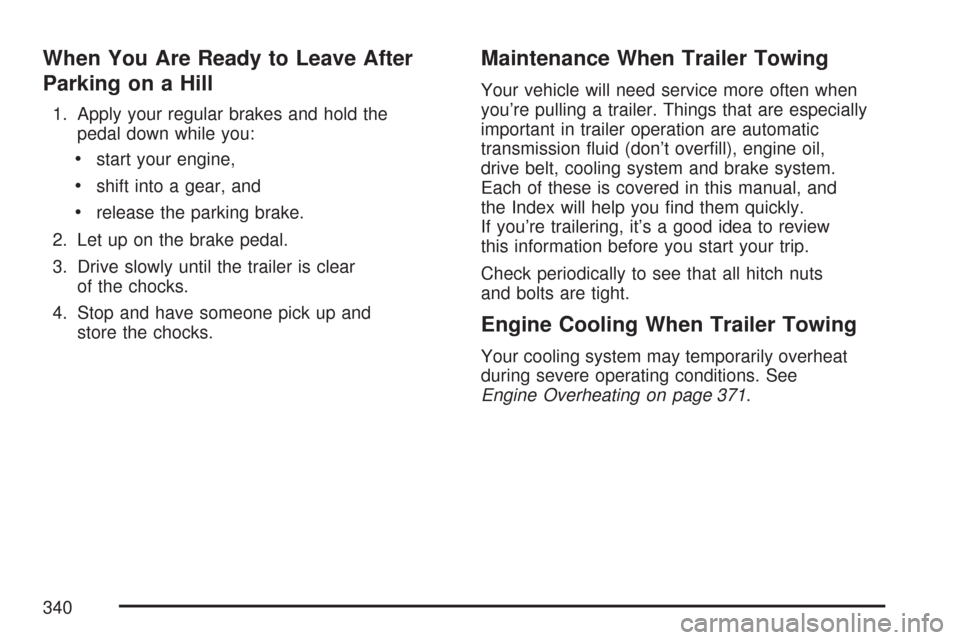
When You Are Ready to Leave After
Parking on a Hill
1. Apply your regular brakes and hold the
pedal down while you:
start your engine,
shift into a gear, and
release the parking brake.
2. Let up on the brake pedal.
3. Drive slowly until the trailer is clear
of the chocks.
4. Stop and have someone pick up and
store the chocks.
Maintenance When Trailer Towing
Your vehicle will need service more often when
you’re pulling a trailer. Things that are especially
important in trailer operation are automatic
transmission �uid (don’t over�ll), engine oil,
drive belt, cooling system and brake system.
Each of these is covered in this manual, and
the Index will help you �nd them quickly.
If you’re trailering, it’s a good idea to review
this information before you start your trip.
Check periodically to see that all hitch nuts
and bolts are tight.
Engine Cooling When Trailer Towing
Your cooling system may temporarily overheat
during severe operating conditions. See
Engine Overheating on page 371.
340
Page 341 of 510
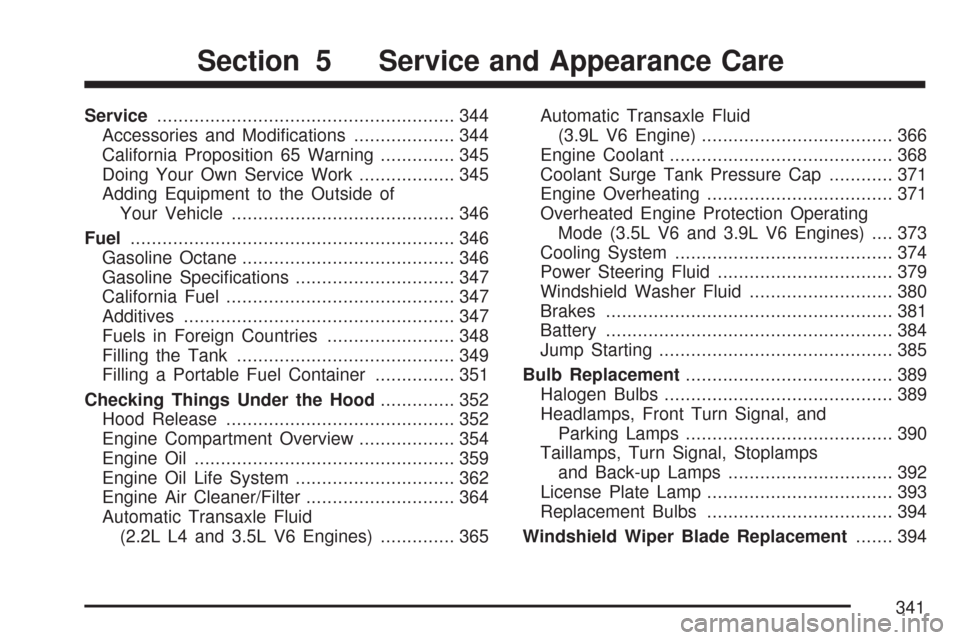
Service........................................................ 344
Accessories and Modi�cations................... 344
California Proposition 65 Warning.............. 345
Doing Your Own Service Work.................. 345
Adding Equipment to the Outside of
Your Vehicle.......................................... 346
Fuel............................................................. 346
Gasoline Octane........................................ 346
Gasoline Speci�cations.............................. 347
California Fuel........................................... 347
Additives................................................... 347
Fuels in Foreign Countries........................ 348
Filling the Tank......................................... 349
Filling a Portable Fuel Container............... 351
Checking Things Under the Hood.............. 352
Hood Release........................................... 352
Engine Compartment Overview.................. 354
Engine Oil................................................. 359
Engine Oil Life System.............................. 362
Engine Air Cleaner/Filter............................ 364
Automatic Transaxle Fluid
(2.2L L4 and 3.5L V6 Engines).............. 365Automatic Transaxle Fluid
(3.9L V6 Engine).................................... 366
Engine Coolant.......................................... 368
Coolant Surge Tank Pressure Cap............ 371
Engine Overheating................................... 371
Overheated Engine Protection Operating
Mode (3.5L V6 and 3.9L V6 Engines).... 373
Cooling System......................................... 374
Power Steering Fluid................................. 379
Windshield Washer Fluid........................... 380
Brakes...................................................... 381
Battery...................................................... 384
Jump Starting............................................ 385
Bulb Replacement....................................... 389
Halogen Bulbs........................................... 389
Headlamps, Front Turn Signal, and
Parking Lamps....................................... 390
Taillamps, Turn Signal, Stoplamps
and Back-up Lamps............................... 392
License Plate Lamp................................... 393
Replacement Bulbs................................... 394
Windshield Wiper Blade Replacement....... 394
Section 5 Service and Appearance Care
341
Page 350 of 510
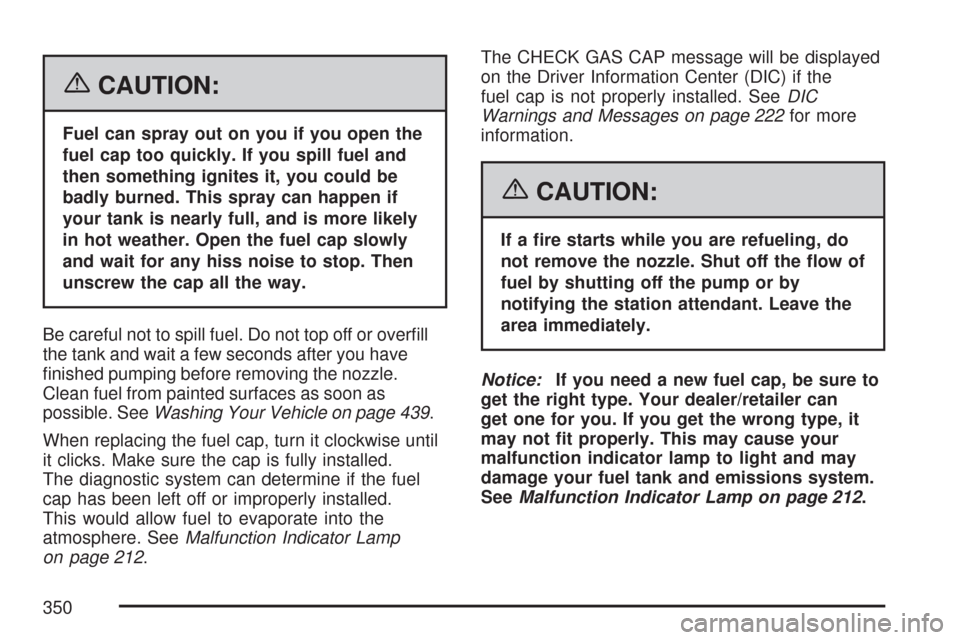
{CAUTION:
Fuel can spray out on you if you open the
fuel cap too quickly. If you spill fuel and
then something ignites it, you could be
badly burned. This spray can happen if
your tank is nearly full, and is more likely
in hot weather. Open the fuel cap slowly
and wait for any hiss noise to stop. Then
unscrew the cap all the way.
Be careful not to spill fuel. Do not top off or over�ll
the tank and wait a few seconds after you have
�nished pumping before removing the nozzle.
Clean fuel from painted surfaces as soon as
possible. SeeWashing Your Vehicle on page 439.
When replacing the fuel cap, turn it clockwise until
it clicks. Make sure the cap is fully installed.
The diagnostic system can determine if the fuel
cap has been left off or improperly installed.
This would allow fuel to evaporate into the
atmosphere. SeeMalfunction Indicator Lamp
on page 212.The CHECK GAS CAP message will be displayed
on the Driver Information Center (DIC) if the
fuel cap is not properly installed. SeeDIC
Warnings and Messages on page 222for more
information.
{CAUTION:
If a �re starts while you are refueling, do
not remove the nozzle. Shut off the �ow of
fuel by shutting off the pump or by
notifying the station attendant. Leave the
area immediately.
Notice:If you need a new fuel cap, be sure to
get the right type. Your dealer/retailer can
get one for you. If you get the wrong type, it
may not �t properly. This may cause your
malfunction indicator lamp to light and may
damage your fuel tank and emissions system.
SeeMalfunction Indicator Lamp on page 212.
350
Page 388 of 510
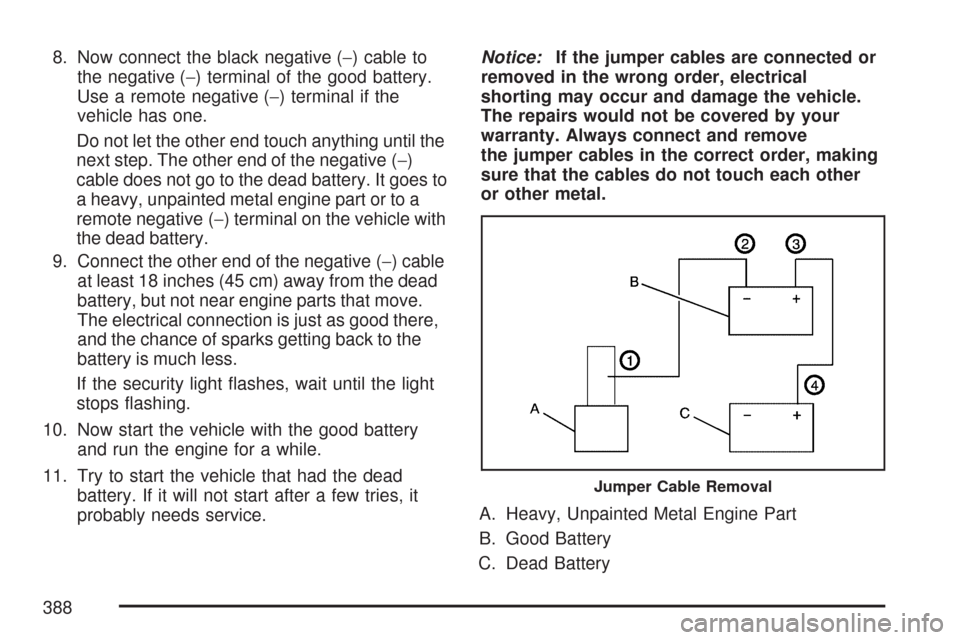
8. Now connect the black negative (−) cable to
the negative (−) terminal of the good battery.
Use a remote negative (−) terminal if the
vehicle has one.
Do not let the other end touch anything until the
next step. The other end of the negative (−)
cable does not go to the dead battery. It goes to
a heavy, unpainted metal engine part or to a
remote negative (−) terminal on the vehicle with
the dead battery.
9. Connect the other end of the negative (−) cable
at least 18 inches (45 cm) away from the dead
battery, but not near engine parts that move.
The electrical connection is just as good there,
and the chance of sparks getting back to the
battery is much less.
If the security light �ashes, wait until the light
stops �ashing.
10. Now start the vehicle with the good battery
and run the engine for a while.
11. Try to start the vehicle that had the dead
battery. If it will not start after a few tries, it
probably needs service.Notice:If the jumper cables are connected or
removed in the wrong order, electrical
shorting may occur and damage the vehicle.
The repairs would not be covered by your
warranty. Always connect and remove
the jumper cables in the correct order, making
sure that the cables do not touch each other
or other metal.
A. Heavy, Unpainted Metal Engine Part
B. Good Battery
C. Dead Battery
Jumper Cable Removal
388